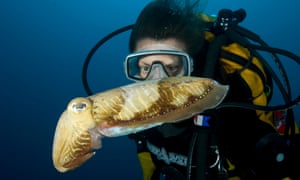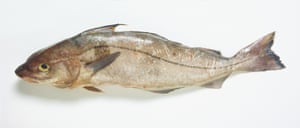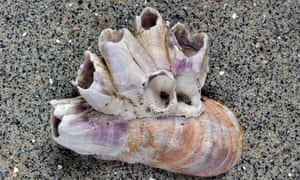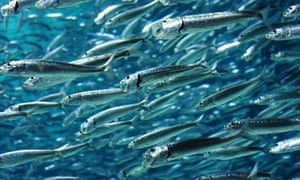Extract from The Guardian
Our seafood diet must adapt, say scientists, as climate change
forces some favourites to colder waters and threatens others
Cuttlefish, usually found in southern waters, have arrived in the UK’s seas. Photograph: Franco Banfi/Getty Images/WaterFrame RM
Robin McKie
Sunday 3 September 2017 06.30 AEST Last modified on Sunday 3 September 2017 07.00 AEST
Britain must prepare itself for invasions of growing numbers of foreign sea creatures attracted by our warming waters, a new report has warned. Some newcomers could have devastating effects, others could be beneficial, say the researchers.
Examples provided by the team include slipper limpets that could destroy mussel and oyster beds. By contrast, new arrivals such as the American razor clam and Pacific oyster could become the bases of profitable industries for British fishermen.
The humble haddock is being forced polewards by rising ocean temperatures. Photograph: Getty Images/Dorling Kindersley
The team’s research also stresses that Britons will have to change their ideas about the seafood they eat as favourites will disappear from UK waters. Haddock and cod are being forced polewards as ocean temperatures rise, while flatfish like sole and plaice have nowhere suitable to go. At the same time, cuttlefish and sardines are being caught in rising numbers and are destined to become the fish of the future for Britain.
“In a few decades the temperature of our seas is likely to be roughly the same as those found in the waters around Portugal at the turn of the last century – so we can expect to find the kind of marine life that existed there in British seas in the near future,” said marine biologist Professor Stephen Simpson, of Exeter University. “Apart from cuttlefish and sardines – which are already moving into our waters – we can expect fish like red mullet and john dory to be more common. By contrast the haddock is already disappearing from the southern North Sea, while plaice and sole are also becoming less and less prevalent. Fortunately, cod appears to be more resilient.”
An American slipper limpet, which experts believe may damage mussel and oyster beds. Photograph: Arterra/UIG via Getty Images
Marine biologists have warned in the past that profound changes will affect the seas surrounding the British Isles but it is still not known exactly when and where the changes will occur.
The new study – by government marine scientists collaborating with Met Office and Exeter and East Anglia university researchers – was carried out to make more accurate predictions about what will happen in our seas as the planet heats up.
“We need to be more precise about the changes that lie ahead,” Simpson said. “At present we are catching more and more fish that is traditional fare for the continent, and we are exporting them back to these countries. At the same time the cod, haddock and sole we used to catch in our own waters are now being caught in remoter fisheries, such as those round Iceland, and are being sold back to us. That is a serious imbalance which, as Brexit approaches, we have to get right.”
The point was backed by the paper’s lead author, Dr Bryony Townhill, of the Centre for Environment, Fisheries and Aquaculture Science (Cefas): “Knowing which species are likely to spread, and to where, means that we can focus efforts to understand their potential impact and explore opportunities to prepare or mitigate them.”
One invader highlighted in the report is the club tunicate – a soft-bodied creature from Asia that Simpson described as looking like “a floating plastic bag”. It has reached UK waters and is very likely to spread round our coast. Not only does it out-compete shellfish in particular for food – causing great harm to mussel beds, for example – but it releases toxins that can trigger respiratory attacks in humans. Other hazards that could take advantage of our warming waters are wireweed and the acorn barnacle. Both compete for food and space with local species and foul harbours and ships.
Sardines have already been found in the UK’s warming waters. Photograph: Andrew JK Tan/Getty Images
By contrast, the report points out that shellfish such as the Manila clam and the American razor clam have considerable potential to form the basis of commercially valuable farms if they become established in our waters.
“We have to be prepared for these sorts of creatures arriving and spreading in our waters,” Simpson added. “They have enormous potential for good – and to cause harm. In the past, many different species used to get washed into our waters but could not survive the cold of a UK winter. Those cold conditions have become a thing of the past, however. Life in our seas is changing.”
Cuttlefish, usually found in southern waters, have arrived in the UK’s seas. Photograph: Franco Banfi/Getty Images/WaterFrame RM
Robin McKie
Sunday 3 September 2017 06.30 AEST Last modified on Sunday 3 September 2017 07.00 AEST
Britain must prepare itself for invasions of growing numbers of foreign sea creatures attracted by our warming waters, a new report has warned. Some newcomers could have devastating effects, others could be beneficial, say the researchers.
Examples provided by the team include slipper limpets that could destroy mussel and oyster beds. By contrast, new arrivals such as the American razor clam and Pacific oyster could become the bases of profitable industries for British fishermen.
The humble haddock is being forced polewards by rising ocean temperatures. Photograph: Getty Images/Dorling Kindersley
The team’s research also stresses that Britons will have to change their ideas about the seafood they eat as favourites will disappear from UK waters. Haddock and cod are being forced polewards as ocean temperatures rise, while flatfish like sole and plaice have nowhere suitable to go. At the same time, cuttlefish and sardines are being caught in rising numbers and are destined to become the fish of the future for Britain.
Native species of
mussels, fish or oysters could be displaced. Harbours and boats could
be fouled or blocked
The latest report, published in Aquatic Conservation: Marine
and Freshwater Ecosystems, provides a crystal ball that could
highlight which parts of our coastlines will be most vulnerable to
climate change triggered by rising atmospheric levels of greenhouse
gas emissions produced by cars, factories and power plants. Sea
temperatures around Britain have already risen by more than 1.5C in
the past 30 years because of these changes, and scientists have
warned this trend could continue for much of the rest of the century.“In a few decades the temperature of our seas is likely to be roughly the same as those found in the waters around Portugal at the turn of the last century – so we can expect to find the kind of marine life that existed there in British seas in the near future,” said marine biologist Professor Stephen Simpson, of Exeter University. “Apart from cuttlefish and sardines – which are already moving into our waters – we can expect fish like red mullet and john dory to be more common. By contrast the haddock is already disappearing from the southern North Sea, while plaice and sole are also becoming less and less prevalent. Fortunately, cod appears to be more resilient.”
An American slipper limpet, which experts believe may damage mussel and oyster beds. Photograph: Arterra/UIG via Getty Images
Marine biologists have warned in the past that profound changes will affect the seas surrounding the British Isles but it is still not known exactly when and where the changes will occur.
The new study – by government marine scientists collaborating with Met Office and Exeter and East Anglia university researchers – was carried out to make more accurate predictions about what will happen in our seas as the planet heats up.
“We need to be more precise about the changes that lie ahead,” Simpson said. “At present we are catching more and more fish that is traditional fare for the continent, and we are exporting them back to these countries. At the same time the cod, haddock and sole we used to catch in our own waters are now being caught in remoter fisheries, such as those round Iceland, and are being sold back to us. That is a serious imbalance which, as Brexit approaches, we have to get right.”
The point was backed by the paper’s lead author, Dr Bryony Townhill, of the Centre for Environment, Fisheries and Aquaculture Science (Cefas): “Knowing which species are likely to spread, and to where, means that we can focus efforts to understand their potential impact and explore opportunities to prepare or mitigate them.”
The cod and sole we
used to catch in our own waters are being caught in remoter fisheries
and sold back to us
The team used advanced oceanographic and climate modelling systems
to forecast environmental conditions in the waters round the UK and
found that many non-native species, which have already had
significant impacts in other nations, could soon become established
in the UK. Native species of mussels, fish or oysters could be
displaced, while harbours and boats – and also cooling ducts for
power stations – could be fouled or blocked, they concluded.One invader highlighted in the report is the club tunicate – a soft-bodied creature from Asia that Simpson described as looking like “a floating plastic bag”. It has reached UK waters and is very likely to spread round our coast. Not only does it out-compete shellfish in particular for food – causing great harm to mussel beds, for example – but it releases toxins that can trigger respiratory attacks in humans. Other hazards that could take advantage of our warming waters are wireweed and the acorn barnacle. Both compete for food and space with local species and foul harbours and ships.
Sardines have already been found in the UK’s warming waters. Photograph: Andrew JK Tan/Getty Images
By contrast, the report points out that shellfish such as the Manila clam and the American razor clam have considerable potential to form the basis of commercially valuable farms if they become established in our waters.
“We have to be prepared for these sorts of creatures arriving and spreading in our waters,” Simpson added. “They have enormous potential for good – and to cause harm. In the past, many different species used to get washed into our waters but could not survive the cold of a UK winter. Those cold conditions have become a thing of the past, however. Life in our seas is changing.”




No comments:
Post a Comment